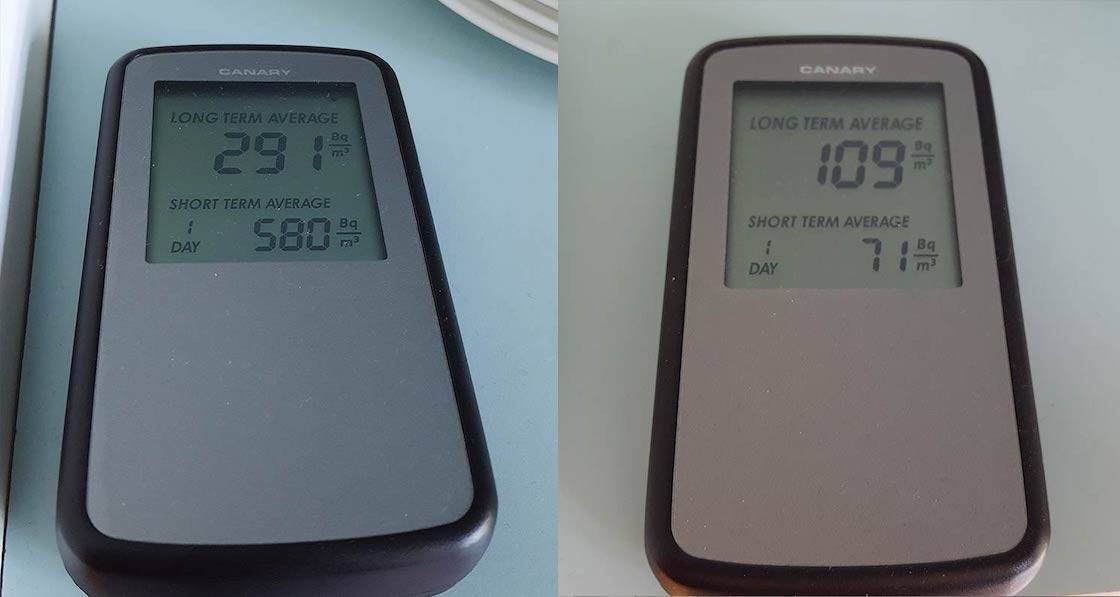
- Government
- Posted
Government failing to act on radon in rented houses
Consultation on rental standards also criticised.
This article was originally published in issue 26 of Passive House Plus magazine. Want immediate access to all back issues and exclusive extra content? Click here to subscribe for as little as €10, or click here to receive the next issue free of charge
(Photo: Radon readings from a house in the UK with the mechanical ventilation system switched off (left) and on (right), revealing that lack of ventilation would cause the cancer-causing gas to accumulate above safe levels)
The government appears unwilling to take action on the threat posed by radon in rented accommodation, freedom of information requests made by the Green Party have revealed.
Records show the Department of Housing opted not to act on the issue, in contravention of both its own National Radon Control Strategy (NRCS) and advice from the Environmental Protection Agency.
Early in 2017, then housing minister Simon Coveney signed off on updated standards for rented housing, but the regulations made no reference to radon.
No public consultation was held on the regulations prior to their adoption.
However, FOI requests made by Green Party councillor for Fingal, David Healy, revealed that the department carried out a closed “stakeholder consultation” with selected agencies and organisations, including the Residential Tenancies Board, the Irish Council for Social Housing, the Irish Property Owners Association, the charity Threshold, and local authorities.
The Environmental Protection Agency (EPA) made a submission in relation to radon gas, reminding the government that the NRCS, which was published in 2014, stated that “radon should be addressed…in the next revision in the Housing (Standards for Rented Houses) Regulations”.
However, department officials made no reference to radon or to the EPA’s submission in their report to the minister, the Green Party’s FOI requests revealed.
In fact, there is no written record of any discussion within the department in relation to the EPA’s recommendations.
The revelations raise questions about the quality and transparency of consultation undertaken by the department on a key housing policy.
Not only did the department fail to carry out a public consultation — potentially a breach of the Aarhus convention on public participation in environmental decisionmaking — but it also appears to have failed to formally consider advice from its own expert agency.
Questions submitted by Passive House Plus to both the Department of Housing and the EPA appear to show the agencies at loggerheads over the issue.
Responding to questions from Passive House Plus, the EPA stated that radon was not included in the revised rental regulations for “practical reasons”, but advised us to contact the Department of Housing to elaborate on what those reasons were. The department, however, was unwilling to answer this question.
The EPA also stated that phase two of the NRCS would contain an action to include radon in the next update to rented housing regulations, and the EPA said it would again make a submission on radon the next time these regulations were under review.
By contrast, the department would only say that “there are no plans to amend regulations to introduce mandatory radon testing in rented accommodation, but the matter will be kept under review”.
The department was unwilling to answer a series of specific questions from Passive House Plus on the matter, including: why the government chose not to address radon in the regulations, whether it was because of concerns that doing so could stifle the rental market, why it did not hold a full public consultation on rental housing standards, and why it did not formally address the EPA’s submission in its report to the minister.
Meanwhile, another recommendation made in the NRCS — namely that the Residential Tenancies Board (RTB) communicate the issue of radon to landlord and tenant representatives — also appears to have been ignored.
Another FOI request by Cllr Healy revealed the RTB possessed no written records on the NRCS whatsoever, suggesting the government had not asked it to carry out this action.
In correspondence with Cllr Healy, the RTB said it now “intends to raise the issue of radon awareness in our upcoming landlords and tenant stakeholder forums and in our communications to landlords and tenants.”
The EPA also emphasised to Passive House Plus that significant progress has been made on radon testing in social housing, with at least 20,000 dwellings tested to date.
Radon is a colourless and odourless gas that results from the decay of uranium in rocks and soils. It is carcinogenic and is responsible for approximately 250 cases of lung cancer in Ireland each year.
Released into open air, it becomes diluted to harmless concentrations, but when it enters buildings through cracks and gaps in floors, it can reach dangerous levels, particularly if ventilation is inadequate or no mitigating measures such as a radon barrier or sump have been installed under the ground floor.
Some areas of Ireland, depending on local geology, are known for having very high radon concentrations. Building regulations now require the installation of certain measures to minimise the level of radon in new homes. For more information see www.epa.ie/radon
Related items
-
 Wales unveils net zero pattern book
Wales unveils net zero pattern book -
 Lung disease patient: Zehnder MVHR “the best thing I’ve ever had”
Lung disease patient: Zehnder MVHR “the best thing I’ve ever had” -
 Chartered Institute of Building urges VAT overhaul to encourage reuse and renovation
Chartered Institute of Building urges VAT overhaul to encourage reuse and renovation -
Awaab Ishak’s death shows that building physics are a life and death matter
-
WorldGBC launches green building policy principles for governments
-
 World’s first passive house hospital completed in Frankfurt
World’s first passive house hospital completed in Frankfurt

